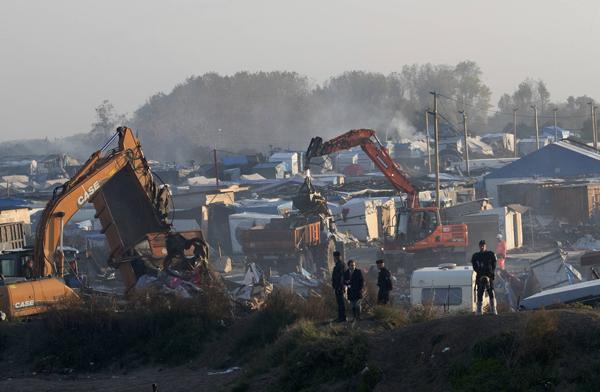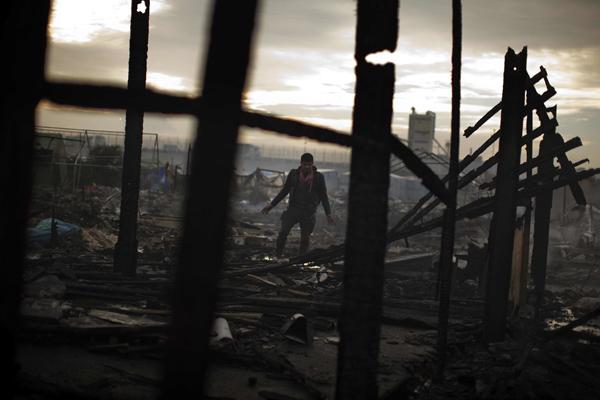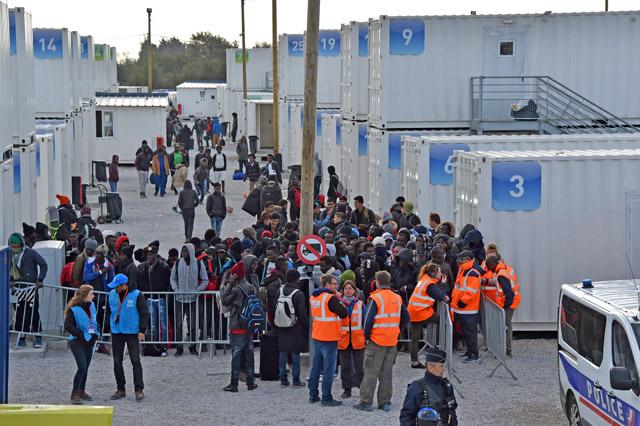You are here
France tells migrants to forget Calais as ‘Jungle’ camp razed
By Reuters - Oct 27,2016 - Last updated at Oct 27,2016

Bulldozers are used to tear down makeshift shelters and tents during the dismantlement of the camp called the ‘Jungle’ in Calais, France, on Thursday (Reuters photo)
CALAIS, France — Bulldozers cleared mounds of debris and tore down makeshift shelters at the “Jungle” migrant camp on Thursday, and authorities said 6,000 people had been evacuated from the squalid site.
Charities said, however, hundreds of migrants might have fled the camp rather than take part in a government programme to rehouse them across the country.
The Jungle, a ramshackle, overcrowded shanty town, came to symbolise Europe’s difficulty in dealing with record inflows of migrants from impoverished and war-torn regions of Africa, the Middle East and Asia, many of them bent on crossing the sea from Calais to Britain.
President Francois Hollande, facing an election six months from now, decided under local pressure to close the Jungle and relocate its inhabitants in towns and villages throughout the country pending examination of their cases.
“By next Monday, the camp will be no more. It is already gone but the [demolition] job will finished by Monday evening,” local government prefect Fabienne Buccio told reporters as earthmovers flattened the camp, where the evacuation started on Monday.
She said more than 6,000 migrants had signed up to be taken to other parts of the country as planned, and that matched the number of people that had been living there.
Police patrolled the camp and other parts of Calais, where dozens of migrants were wandering.
“Lots of children are sleeping outside. We had a group of Eritrean boys, 13 and 14 years old, last night, who slept outside,” said Dorothy Sang, a worker with the Save the Children charity.
“Other children fled. They lost faith in the system.”
A young man from Sudan who said his name was Clinton told Reuters he had arrived overnight from Germany and was “here for England” as a final destination.
“But it is also okay if I can file an [asylum] request in France. It doesn’t matter where I sleep tonight,” he said.
Buccio said she wanted to make clear to any would-be new arrivals in the French port that the camp was shut for good and the rehousing exercise finished.
“It is not Calais’ role to receive all the migrants of Europe,” she said.
Back to Paris?
There were signs that some migrants might have fled from Calais to Paris to avoid being roped into official processing of asylum requests.
Heloise Mary, working to help migrants at a smaller camp under a bridge in north Paris, said numbers there had suddenly shot up.
“We’ve gone from 2,000 to 3,000 in two days with the closure of Calais,” she told BFM TV of the makeshift camp, where a railway bridge provides cover for hundreds of tents and mattresses.
The numbers of irregular migrants reaching Europe are sharply down on the 1.3 million who arrived in 2015. But more than 300,000 have made the hazardous Mediterranean crossing in 2016 so far, and many are likely to head for Britain for work, launguage and family reasons.
The British referendum vote this year to quit the European Union was in large part driven by worries over immigration, and stoked by scenes of the Calais migrants trying to force their way in.
Now that Britain is leaving the EU, right-wing French politicians with an eye on next year’s election want to tear up the agreement under which Britain’s border controls are conducted in France.
Related Articles
CALAIS, France — The last buses out of the Calais “Jungle” left the French camp on Thursday, carrying 291 migrants, mostly couples and women
PARIS — France announced on Monday it would open two shelters for migrants sleeping rough around the Port of Calais, relenting to pressure t
CALAIS, France — President Emmanuel Macron vowed on Tuesday that France would not allow another migrant camp like the infamous "Jungle"



















